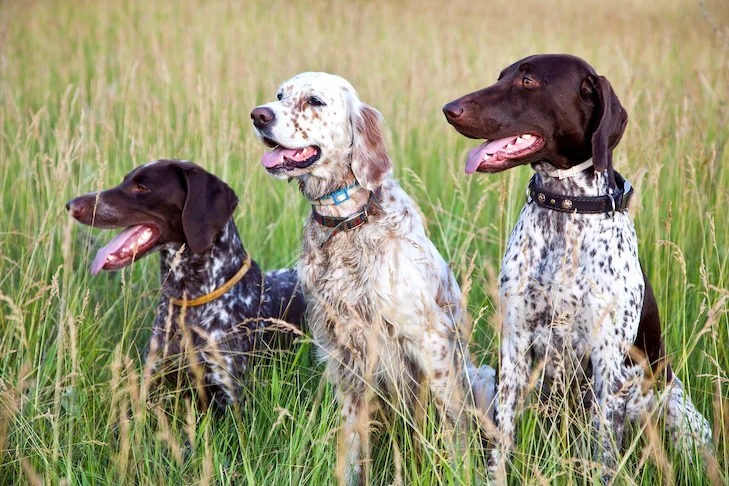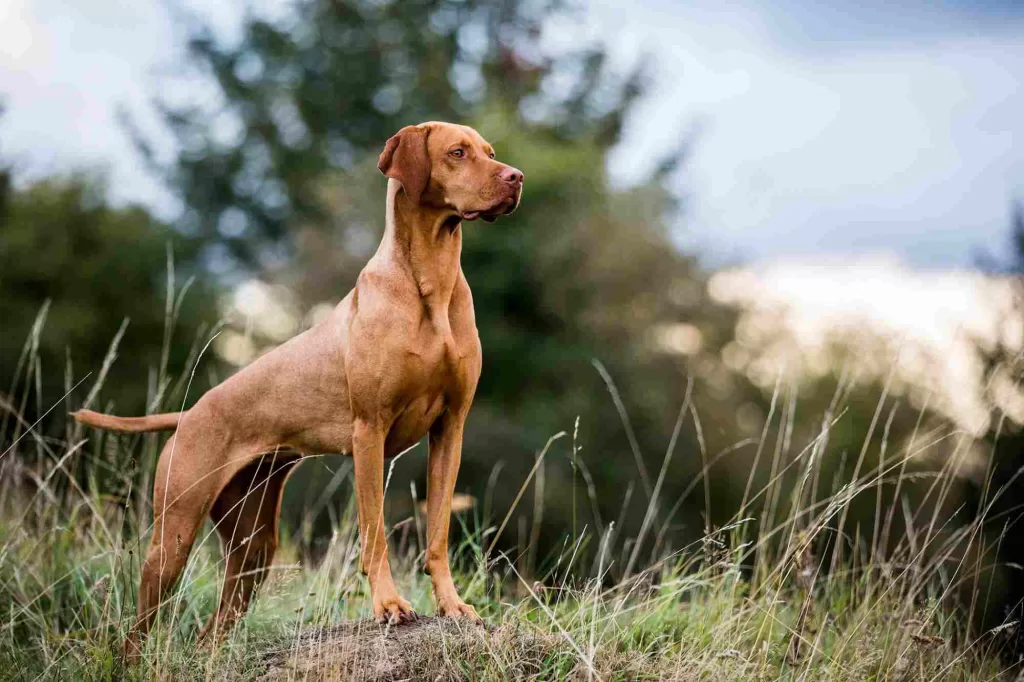Dog Breeds for Hunting: Using dogs for hunting could be an amazing and beneficial experience. Early humans and canines were believed to have hunted together. Predatory drive, a willingness to learn, stamina, and athleticism are all necessary for a hound to be an effective hunter.
Table of Contents
This article will discuss different types of hunting dog breeds that make great hunting dogs.
Characteristics of a Dog Breed for Hunting

There are several characteristics commonly associated with dog breeds that are good for hunting. Here are some of them:
- Sense of Smell: Hunting dogs need an excellent sense of smell to track and identify game. Some breeds, such as bloodhounds and beagles, have a particularly strong sense of smell.
- Endurance: Hunting dogs must be able to stay with their human hunting partners for long periods of time, sometimes over rough terrain. Breeds like the German Shorthaired Pointer and Vizsla are known for their stamina.
- Training: It is important that hunting dogs can be easily trained for obedience and specific hunting tasks. Breeds such as the Labrador Retriever and Golden Retriever are popular for their training.
- Intelligence: Hunting dogs must be able to think on their feet and adapt to changing conditions in the field. Breeds such as the English Springer Spaniel and the Brittany are known for their intelligence.
- Temperament: Hunting dogs must have a certain level of aggression and tenacity to flush out the game and retrieve it, but they must be able to work well with their human hunting partners. Breeds like the Weimaraner and Pointer are known for their good nature.
It is important to note that different hunting species have different characteristics, and what is best suited for hunting one species may not apply to another. Additionally, while genetics play a large role in determining a dog’s suitability for hunting, proper training and socialization are also important factors in ensuring that a dog is a successful hunting partner.
Also Read: Why Is My Dog’s Tongue Turning Purple?
Choosing a dog should be based on your hunting goals. Here is some information about the famous hunting dog breeds or additionally you can also refer to TrendingBreeds.com
a) Labrador Retriever
One of the most well-liked types of hunting dogs is the Labrador Retriever. This kind of dog can resist freezing temperatures and swim effortlessly through icy water. They are also active, energetic, and loyal. Labrador Retrievers make fantastic companions and family pets when they are not working.
Characteristics of Labrador Retriever
They have robust and athletic bodies. Their outer is soft and has water-resistant coats; otter-like tails, large skulls, and powerful jaws with kind eyes.
b) Golden Retriever
The Golden Retriever is a dog that is eager to please, devoted, and easy to train. Golden Retrievers, like Labradors, are also gun dogs, like their Labrador cousins. As a family pet, they’re known for their ability to get along well with children. However, they require a high level of physical and mental stimulation for hunting.
Characteristics of Golden Retriever
They possess a gold-coated body with a broad head; kind and intelligent eyes and are excellent dog breeds for hunting.
c) Beagle
Recognized as a scent hound, the Beagle has a powerful bark and an even stronger sense of smell, which is the best characteristic used as dogs for hunting. They have a well-deserved reputation for being warm, affectionate, and obliging. The primary purpose of this breed is to hunt rabbits, which means it’s the best hunting dog for rabbits.
Characteristics of Beagle
They have a domed skull head, square nose, floppy ears, and perky tail held high with a muscular physique.
d) American Foxhound
The American Foxhound is a determined scent hound. The breed was developed from English foxhounds as English hunting dogs were initially used for hunting foxes. Foxhounds are loving and loyal companions, but they require a lot of exercise daily.
Characteristics of American Foxhound
They contain long, slender legs, a long, curved tail, and a large head with floppy ears.
e) English Springer Spaniel
The English Springer Spaniel is a fantastic bird dog, especially when fleshing out and chasing pheasants. This dog’s retrieving abilities rival those of the Labrador and golden retriever.
Characteristics of English Springer Spaniel
They belong to medium-length feathered coats and gentle facial expressions with drop ears.
f) English Pointer
The English Pointer is a bird dog with a strong prey drive and a determined demeanor. The Pointer will aggressively pursue prey such as quail and pheasants. A pointer is a loyal and loving companion on the hunt or the couch.
Characteristics of English Pointer
Having a short, dense coat. They lean and possess a muscular build, standing upright to point to a target with its wide nose and long tail.
g) Chesapeake Bay Retriever
The Chesapeake Bay Retriever, a brown hunting dog, is a robust and athletic gun dog. This breed is intelligent and usually very loyal to its owner. However, unlike Labrador, this breed is not for everyone. A Chessie is devoted to its family but wary of strangers.
Characteristics of Chesapeake Bay Retriever
Having athletic build; bendy, oily coat with brown or tan coloration.
h) Bluetick Coonhound
The Bluetick Coonhound is a scent hound capable of pursuing and treeing almost any creature it encounters. This breed has been observed chasing cougars and mountain lions. These are active dogs with excellent noises.
Characteristics of Bluetick Coonhound
Coat in dark blue with black dots on back, ears, and sides; may have short, sleek, and lustrous tan markings.
i) English Setter
As Setters gained popularity, they were divided into two training categories: conformation and field. Field dogs are smaller and lighter in feathering, making them ideal for hunting. Because of their larger frames and long feathers, conformation dogs make excellent show dogs and pets. These dogs are excellent at retrieving, making them ideal for bird hunting.
Characteristics of English Setter
Their fur is flat and silky, with wavy feathering on the ears, tail, legs, and underbelly; large ears; a thin neck and tail with a slender body.
j) Irish Setter
The Irish setter is a gun dog with a stunning red coat and graceful agility. This breed is more challenging than it appears; it is tough, hardworking, and determined as dogs for hunting birds. Irish setters make friendly, affectionate, and gentle companions.
Characteristics of Irish Setter
The coat is usually flat, silky, long, and soft; the color is deep chestnut red.
How Do You Train Hunting Dogs?
Veterans can train their canines. It takes a lot of training to develop a puppy into a hunting dog, including getting them used to the rifle, teaching them to wait and retrieve, and more. Many people (including experts) bring their puppies to specialist facilities for hunting dog training.
How to Know Which of The Hunting Dogs Suit You The Best
Your lifestyle will determine, which suits you the best. Some dog breeds shed more than others, so grooming can be expensive because a pup requires a lot of care with time and money. Daily care is also very important that a pet parent should know. Different tools and kits are available for this purpose such as dog nail grinder, trimmers, bathing kits etc. You may need to consider multiple things before getting a hunting puppy or a dog.
Things to consider while choosing the hunting dog
Choosing the best hunting dog for you requires careful consideration and research. Here are some things to consider when choosing a hunting dog:
- Hunting Style: Different hunting dogs are bred for different types of hunting like upland bird hunting, waterfowl hunting or big game hunting. Consider the type of hunting you want to do and choose the breed that best suits that activity.
- Energy level: Different hunting breeds have different energy levels, so consider your own energy level and lifestyle when choosing a dog. Some breeds require a lot of exercise and mental stimulation, while others are low-key.
- Training: Some breeds are easier to train than others, so consider your own training experience and skills when choosing a dog. Some breeds are highly trainable and eager to please, while others may be more stubborn or independent.
- Temperament: Consider the breed’s temperament and choose a dog that best fits your family and lifestyle. Some breeds are more outgoing and social, while others may be more reserved or independent.
- Coat Type: Different hunting breeds have different coat types that affect their suitability for certain types of hunting. For example, breeds with thick, water-resistant coats are better suited for waterfowl hunting, while breeds with shorter coats are better suited for upland bird hunting.
- Size: Consider the breed’s size and how it fits into your home and lifestyle. Some species are large and require a lot of space and exercise, while others are smaller and more adaptable.
- Health: Consider health issues that are common in the breed and make sure you are prepared to give your dog the care and attention it needs to keep it healthy.
By considering these factors and researching different hunting breeds, you can choose the dog that best suits your hunting needs and fits your family and lifestyle. Additionally, it’s important to work with a reputable breeder or rescue organization to ensure you’re getting a healthy and well-socialized dog.
FAQs on Best Dog Breeds for Hunting
What are the characteristics of a good hunting dog?
Good hunting dogs are typically intelligent, loyal, and have a strong prey drive. They should also have good stamina, be trainable, and be able to work well in a variety of environments and weather conditions.
How do I choose the right hunting dog breed for me?
When choosing a hunting dog breed, consider the type of game you plan to hunt, the climate and terrain where you’ll be hunting, and your personal preferences for dog size, temperament, and energy level.
Do I need to train my hunting dog?
Yes, hunting dogs require specialized training in order to be effective in the field. This training should start at a young age and should include obedience, socialization, and specific hunting skills like retrieving or tracking.
Can hunting dogs also make good family pets?
Yes, many hunting dog breeds make excellent family pets, as long as they receive enough exercise and mental stimulation. However, it’s important to remember that these dogs are bred for specific hunting instincts, and may have a higher energy level and prey drive than other breeds.
How much exercise do hunting dogs need?
Hunting dogs are typically high-energy breeds that require a lot of exercise, both physical and mental. Depending on the breed, they may need anywhere from 30 minutes to several hours of exercise per day, including walks, runs, and training sessions.
What are some common health issues in hunting dogs?
Some common health issues in hunting dogs include hip dysplasia, ear infections, and skin allergies. It’s important to choose a reputable breeder and provide your dog with regular veterinary care to ensure their health and well-being.
Final Thoughts
Dogs are comforters, protectors, and caregivers. Twenty thousand years ago, dogs and their owners hunted together. Modern man no longer needs wild wildlife for subsistence, yet hunting is still necessary. Many man-dog teams still carry dogs for hunting; they hunt peacefully and responsibly, enhancing their bond.

